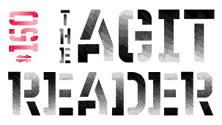
Channel Pressure
Software
Besides getting legal threats hurled their way, Games was basically a playful, un-Googleable starting point for Joel Ford and Daniel Lopatin to explore the boundaries of their FM pop fantasies. Now, with their moniker changed to the more respectable Ford and Lopatin (the Hall and Oates parallels are there), they’ve made good on the promise foretold in our January interview with Ford. With Channel Pressure they’ve created a record that emits an ultimate miasma of majestic synths (a product of Lopatin’s experience in Oneohtrix Point Never) and giant hooks reeking of neon and plastic, rollerrinks and ghetto asphalt, and carefree nostalgia and future doom. Picked apart, Channel Pressure may elicit groans against the duo’s color-by-numbers approach to songwriting (though those colors are extremely vivid). Arguments that the same effect gleaned from “World of Regret” and “The Voices” can be had in used Scritti Politti or Level 42 records are certainly warranted. But much in the way Guided By Voices had teenagers searching for Gabriel’s Genesis records and Blue Oyster Cult in the mid-90s, Channel Pressure is sure to lead to new discoveries. One listen to any of their myriad mixtapes proves that their spectrum of influence is wide and blinding.
And that shows in the high concept of Channel Pressure. This is an album meant to be ingested in one sitting. Though it’s hard to truly follow the story of protagonist Joey Rogers—he seems controlled by his Intellivision, swooned by digital sirens and eventually bows to hi-fidelity—it’s quite easy to become engaged in the imaginative world Ford and Lopatin conduct with their spaceage arsenal of electronic gewgaws. The duo have explained in advance that the sonic arc of Rogers’ journey and the whole of Channel Pressure was very much inspired by the incidental music from ’80s Z-grade teen romps, hair metal training montages, big-named instrumentalists like Jan Hammer (in whose studio they tracked the album), and higher fare zaniness like Weird Science. The best testament to this blatant indulgence is that Channel Pressure rarely falls prey to the novelty of how that list looks on paper. This is far from disposable dance music. Channel Pressure is cosmic funk, awkward progressive jazz, smooth quiet storm R&B, noise-laden 8-bit circuit twisting and, above all else, purely airy pop. But Ford and Lopatin take great measures to include every bit of their maximalist vision, not just the catchy baubles, and it’s that dedication which constantly pushes this album into the future.
Kevin J. Elliott

Suck It and See
Domino
The internet has played a large role in the Arctic Monkeys’ success. Legions of fawning fans blogging and sharing and MySpacing and buzzing about their debut led to substantial hype, the likes of which hadn’t been seen since the olden days of the Blur and Oasis Britpop wars. The nature of that hype, of course, is that it was grassroots and had almost zero connection to big record companies and artists' representation agencies. Times have changed. Sure, there’s plenty of hype for this, their fourth proper studio album, but it is surely not coming as hot off the band’s fingertips as those first few hundred CDRs they pitched at shows. They have people employed to worry about that. The band has gotten to the point where they probably don’t even entertain questions about their name any longer, as it has turned into a brand in and of itself—like Kleenex or Xerox or Radiohead. Now they can concentrate on plain old songwriting.
In this respect, much like their hype machine, they’ve mellowed out. Is it old age? One thing is clear: they’ve been listening to a whole lot of Morrissey and Bowie. The Thin White Duke surely informed Suck It and See’s first single, “Brick By Brick,” as the moaning crooning and growling guitar owe much to Lodger-era Bowie, while Moz-style turns-of-phrase show up all over the record. On “Piledriver Waltz,” Alex Turner intones, “If you’re gonna try and walk on water make sure you wear your comfortable shoes.” Elsewhere, there’s plenty of Arctic Monkeys pop lyric nonsense. For example, take “I take the batteries out my mysticism and put ’em in my thinking cap,” from “The Hellcat Spangled Shalalala.” Keep in mind, this band built their rep trying to guilt party girls onto the dancefloor and away from their Chav boyfriends, so this is definite artistic growth. These guys are the type of kids that probably could have been pro athletes had they not been intelligent enough to put their powers to good, creative use. They’re secretly good at everything, but they’ve been dumbing it down for the masses up until now. So I think we’re just supposed to take the advice offered by the album title in order to get to the heart of this album and its gleaming gems.
Michael P. O’Shaughnessy

Clutching Stems
Merge
It should come as no surprise that the bulk of Clutching Stems, the Ladybug Transistor’s seventh album, explores themes of loss, sadness and recovery. The album represents the band’s first recorded work since longtime drummer San Fadyl tragically died after suffering a severe asthma attack shortly before the release of 2007’s Can’t Wait Another Day. And while the group’s music has always tended toward the more subtle and contemplative side of the pop spectrum, Clutching Stems often sounds somber, as if it is a musical document of the band’s struggle to move forward following the death of one of its key members.
Instrumentally, the album will sound familiar to long-time Ladybug Transistor listeners, with its acoustic rhythm guitars and clean electric leads, organs, and synths. What makes the album singular, though, is the band’s ability to use these familiar sounds in a way that sounds uplifting, even while dealing with heartbreaking subject matter. The title track and “Caught Don’t Walk,” for instance, feature understated verses that build up to soaring choruses which bring light into the darkness of lyrics dealing with isolation and tragedy. With tracks like these setting the tone for the album, even the more stereotypical “sad” songs, like “Into the Straight” and “Life Less True,” are still effective, as the record has a nice, cohesive feel. For a band that has been operating for more than 15 years and has seen its share of obstacles in recent times, Clutching Stems serves as both a badge of perseverance and an insightful pop album.
Ron Wadlinger
MP3: “Clutching Stems”

Little Hell
Vagrant
To state a fact: Dallas Green is multitalented. Depending upon your musical interests, you may know him as either guitarist and sometimes vocalist of Canada’s post-hardcore darlings Alexisonfire or the soft-crooning mastermind behind the acoustic outfit City and Colour. In all likelihood, you may have heard of one and hate the other, as post-hardcore and acoustic don’t exactly strike the same harmony in the ears. When he won a Juno in 2007 for Alternative Album of the Year for his first solo release, people might have said it was a fluke, that he was being rewarded for opening up and showing a softer side. When he won again in 2009 (Songwriter of the Year) for his sophomore release, Bring Me Your Love, it was obvious it wasn’t just a ruse.
Little Hell is Green’s third solo endeavor and undoubtedly his most well-rounded effort yet. Like previous albums, song lyrics still read like a therapy session, and there’s no shortage of sentimental and somber subjects breached. Melodramatic? Sure, at times, but there’s a comforting feeling of sincerity here. No doubt, he’s lived through what he’s singing. Musically, Little Hell expounds upon the predominately acoustic, barebones styling of Love with lush bass rhythms and dreamy background vocals. “Natural Disaster” and “Sorrowing Man” wax bluesy and are a departure from straightforward strumming. “Fragile Bird” and “Northern Wind” make still greater leaps by adopting funk grooves and elegant strings, respectively. The album, however, is not without straightforward ballads (“We Found Each Other in the Dark”), which recall previous gems like “Confessions” and “The Death of Me.”
Yet, for the slight upturn the album takes, there is an equally pervasive sense of longing and loss. The cynicism of “The Grand Optimist” is heavy, though true to form, is juxtaposed with a relentlessly uplifting melody. It’s clear that Green is plagued by insecurities and near-constant anxiety. In less than 50 minutes, this album tackles addiction, depression, failure and sorrow, and this is Green’s chosen release. In the end, beautifully crafted metaphors and melodies seem to be his way of escaping his own little hell.
Jennifer Farmer

Go With Me
Hardly Art
There’s more than a little of that good ol’ Pacific Northwest jangle at the heart of Seapony. Comparisons to Beat Happening are appropriate, but beyond the paint-by-numbers song structure, the gender ratio and the fact that they’re currently based in Olympia, it’s kind of like saying sugar tastes sweet. Duh. There’s something in the water out there that makes for great bands with sunny dispositions. Perhaps it’s the constant struggle with the grey weather that fosters a need to bring a little light into the gloom?
Danny Rowland handles the writing, but singer Jen Weidl brings the vocals to life, like a colorist does with a comic book. The lyrics are refreshingly twee at points, reminiscent of Talulah Gosh or more wistful and pensive like someone trying to explain a Smiths song to an eight-year-old girl. The guitar and bass trade off main melodies, which keeps the riff to jangle ratio nice and even and never boring. One thing that stuck out on the first listen was the lack of cymbal crashes and the fact that the hi-hat on “Always” sounded way too perfect. A little research yielded the truth: that the rhythm section is half machine. Bassist Ian Brewer is very human, but his drummer is an Alesis HR-16, which is one of those awesome ’80s machines nerds covet because they sound like, well, Beat Happening. Seapony manages to juxtapose that staid and mechanical sound with an extremely vibrant human energy without relying on synths or heavy distortion or even all that much reverb to cover up the inherent soullessness of the machine. It’s a perfect mix, which is extremely difficult to obtain. Seapony is on the crest of a new wave of female-fronted hazy bands that have been filling up our new-spin bins, the kind that eschew the affected angry Ani shtick and shrug at the torrid Amos, preferring to embrace the post–Bikini Kill do-what-you-want ethos, like Le Sera and the Whines. This is a trend that should turn into the norm, to the point where it’s like saying sugar is sweet.
Michael P. O’Shaughnessy
MP3: “Blue Star”
ALBUM REVIEWS
My Morning Jacket, Circuital
Friendly Fires, Pala
Ear Pwr, Ear Pwr
Various Artists, Blow Your Head V.2: Dave Nada Presents... Moombahton
Kid Congo and the Pink Monkey Birds, Gorilla Rose
Urge Overkill, Rock & Roll Submarine
White Denim, D
Zachary Cale, Noise of Welcome
Tara Jane O'Neil and Nikaido Kazumi, Tara Jane O'Neil and Nikaido Kazumi
Thurston Moore, Demolished Thoughts
D. Charles Speer & the Helix, Leaving the Commonwealth
Nodzzz, Innings
Danger Mouse and Daniele Luppi, Rome
Bachelorette, Bachelorette
